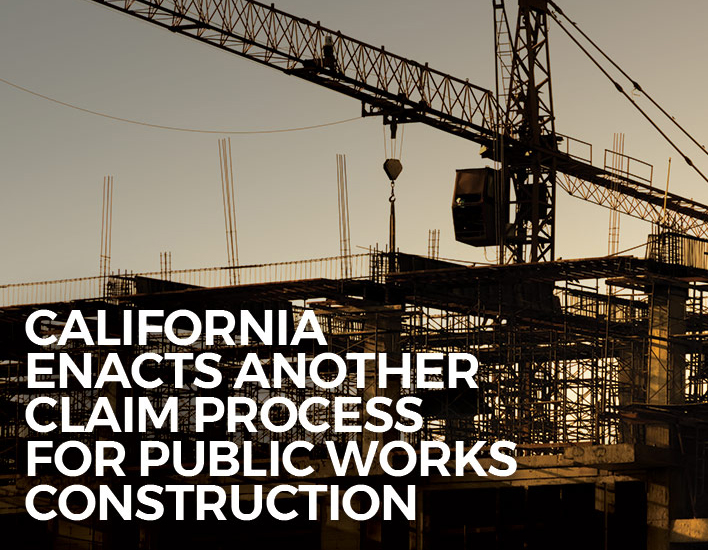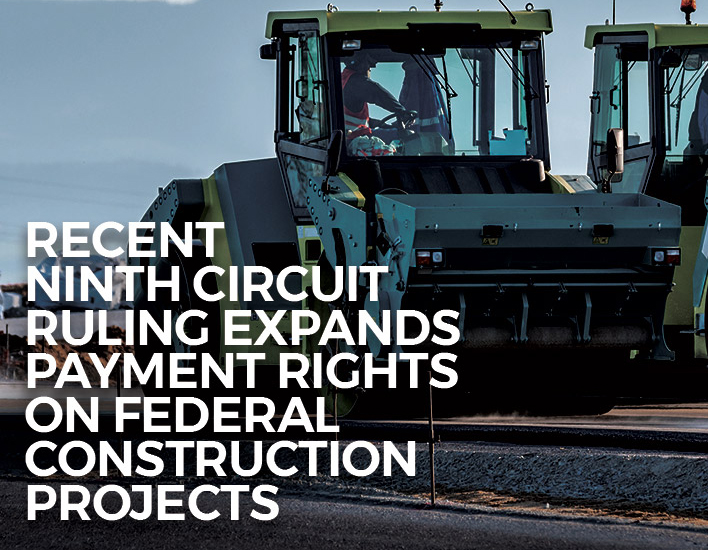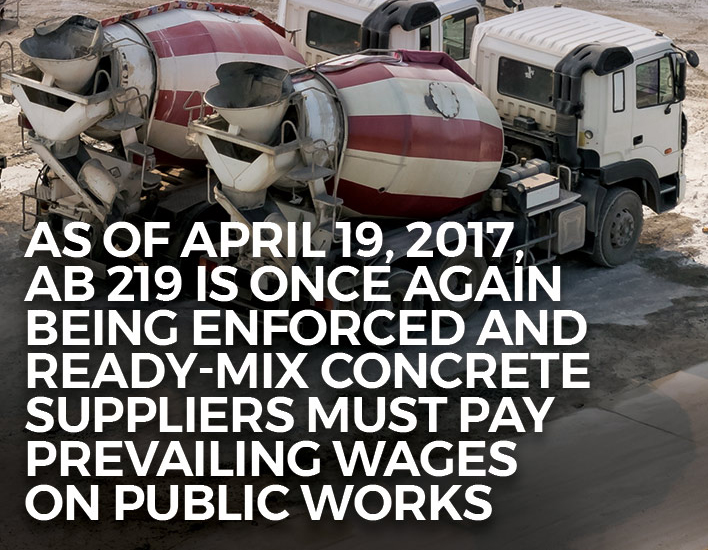By: Jeffrey B. Baird, Esq., Partner, of Finch, Thornton & Baird, LLP.
For contractors working on a public works project, the Legislature has added Section 9204 to the Public Contract Code, which applies to contracts entered into on or after January 1, 2017. Prior to the enactment of Section 9204, contractors pursuing a claim against a public entity were required to comply with certain claims procedures before litigation could be filed, e.g., Government Code section 910 et seq. and Public Contract Code section 20104 et seq. claims. The new provisions of Public Contract Code section 9204 both compliment and supplement these requirements.
NEW PROCESS UNDER SECTION 9204
A “claim” is defined under Section 9204 as a separate demand by a contractor in writing for any of the following: (1) a time extension or relief from liquidated damages or penalties; (2) a demand for money; or (3) a demand for payment for added or disputed work. A Section 9204 claim must be submitted with evidentiary material supporting the claim. There is no mandated deadline to bring a Section 9204 claim, but a contractor should act promptly to ensure other statutory deadlines are satisfied.
When a public entity receives a contractor’s Section 9204 claim, it must conduct a “reasonable review” of the claim and respond by written statement within 45 days. If the claim response needs approval by a governing board, and the board does not meet within the 45 day period, then the response is due within three days of the next meeting of the governing board. The written response must clearly identify the portions of the claim that remain disputed and those that are not. The public entity must process and pay any undisputed amount within 60 days of the public entity’s written response. The claim is deemed denied in its entirety if the public entity fails to respond.
If the contractor disputes the entity’s decision or if the public entity fails to respond in the required time, the contractor must make a written demand for an informal meet and confer conference to settle the disputed issues. The demand for the meet and confer must be made to the public entity by mail — return receipt requested or certified. There are no time restrictions in Section 9204 as to when such a demand can be made but the contractor should make its submission in a timely manner to ensure other statutory deadlines are not violated. The meet and confer conference is then held within 30 days of receipt of the demand. If the meet and confer conference does not resolve the disputed issues, the public entity is required to provide a written statement detailing those issues that remain disputed and those that are not within 10 days of the conclusion of the conference. Again, any undisputed payments need to be made within 60 days after the written statement is issued.
If any portion remains disputed after the meet and confer process, the parties must submit the matter to non-binding mediation, the costs of which are to be borne equally by the parties. “Non-binding mediation” includes mediations, dispute resolution board hearings and neutral evaluation processes. The parties must agree to a mediator within 10 days after the written statement is issued. If the parties cannot agree on a mediator then each party must choose one mediator and those mediators, in turn, shall select a neutral third party to act as the mediator. Each party will bear the fees and costs charged by their respective mediator during the process.
If the mediation proves unsuccessful, then the remaining disputed claims are subject to any applicable procedures outside of Section 9204.
SUBCONTRACTOR CLAIMS
Subcontractors or lower tier subcontractors without a direct contract with the public entity lack contractual privity to present a claim to the public entity. However, Section 9204 specifically provides that a subcontractor may submit a written request, on its own behalf or on behalf of a lower tier subcontractor, for the contractor to present a claim to the public entity. The subcontractor is required to furnish reasonable documentation to support the claim. The contractor must advise the subcontractor in writing within 45 days if the contractor presented the claim to the public entity. If the contractor did not present the claim to the public entity, it must advise as to the reasons it did not.
CONSTRUCTION WITH OTHER APPLICABLE PROCEDURES
Contractors must be aware of other applicable provisions in pursuing public works claims including Government Code section 910 et seq. and Public Contract Code section 20104 et seq., which apply to claims against most public entities. Currently, a contractor must prosecute its claim initially under Government Code section 910 et seq. prior to filing suit. For any claim under $375,000.00, Public Contract Code section 20104 provides specific procedures the contractor must also follow.
However, the Legislature has seen fit to make Section 9204 applicable to all claims, regardless of the amount in controversy. Thus, for claims arising under any contract entered into on or after January 1, 2017, a contractor must pursue such claims under Section 9204 in addition to engaging the process of Government Code section 910 et seq. or Public Contract Code section 20104 et seq.
Another notable effect is mediation conducted under Section 9204 excuses any further obligation to mediate under Public Contract Code section 20104.4. However, the mediation process under Section 9204 does not preclude arbitration under the Public Works Contract Arbitration Program, if that program is required.
The new law also requires the text of Section 9204, or a sufficient summary, to be set forth in the plans and specifications for any public works project awarded after January 1, 2017. Public entity owners will have to update their current plans and specifications to comply with the new requirements. Also, the Legislature has found that a waiver of the contractor’s rights under Section 9204 is void as contrary to public policy. However, a public entity may prescribe additional and reasonable change order, claims and dispute resolution procedures and requirements as long as they do not conflict with Section 9204. Thus, contractors must study their contract specifications carefully to determine the appropriate trigger for change orders, claims or other dispute resolution requirements.
PUBLIC CONTRACT CODE SECTION 9204 DOES NOT APPLY TO ALL PUBLIC ENTITIES
Section 9204 applies to all state and local agencies unless specifically excluded in Section 9204. The excluded agencies are The Department of Water Resources, The Department of Transportation, The Department of Parks and Recreation, The Department of Corrections, The Military Department, The Department of General Services and The High Speed Rail Authority.
UNANSWERED QUESTIONS
What remains unclear is how prosecution of claims under Section 9204 affects the timing requirements of Government Code section 910 et seq. and Public Contract Code section 20104 et seq. For example, for claims of $375,000.00 or less, a contractor must prosecute the claim under Public Contract Code section 20104 et seq. Public Contract Code section 20104.2, subdivision (e) specifically provides for tolling of the period of time within which a claim must be filed under Government Code section 910 et seq. while the claim is being prosecuted under Section 20104.2.
The new provisions of Section 9204 contain no such tolling language. Thus, the Legislature has not made clear whether a claim under Section 9204 is required to be exhausted or pursued concurrently with these other claims requirements. Rather than have a clear process for contractors, contractors will need to seek legal advice as to the proper claim procedures to follow.
GOING FORWARD
Section 9204 is a well-intentioned attempt by the Legislature to increase efficiency in the prosecution of public works claims. If proven successful, this new statute will, hopefully, provide for timely resolution of claims without the necessity of costly litigation. However, there is a risk a public entity could use Section 9204 to stall the resolution of meritorious claims. Contractors must be on the lookout to determine how the new requirements are incorporated into their contracts with respect to change orders and other claim requirements. Contractors must further be aware Section 9204 applies notwithstanding other applicable claims prosecution statutes such as Public Contract Code section 20104 et seq. and Government Code section 910 et seq. If a claim is to be pursued, the contractor will likely have to comply with its contract, Section 9204, Public Contract Code section 20104 et seq. and Government Code section 910 et seq.
If you have any questions regarding Public Contract Code section 9204, please contact an attorney at our office. For a PDF of this article, click here.
LEGAL DISCLAIMER: This new law advisory is a publication of Finch, Thornton & Baird, LLP, for the purpose of providing information relating to recent legal developments. It is not intended, nor should it be used, as a substitute for specific legal advice, and it does not create an attorney-client relationship.


